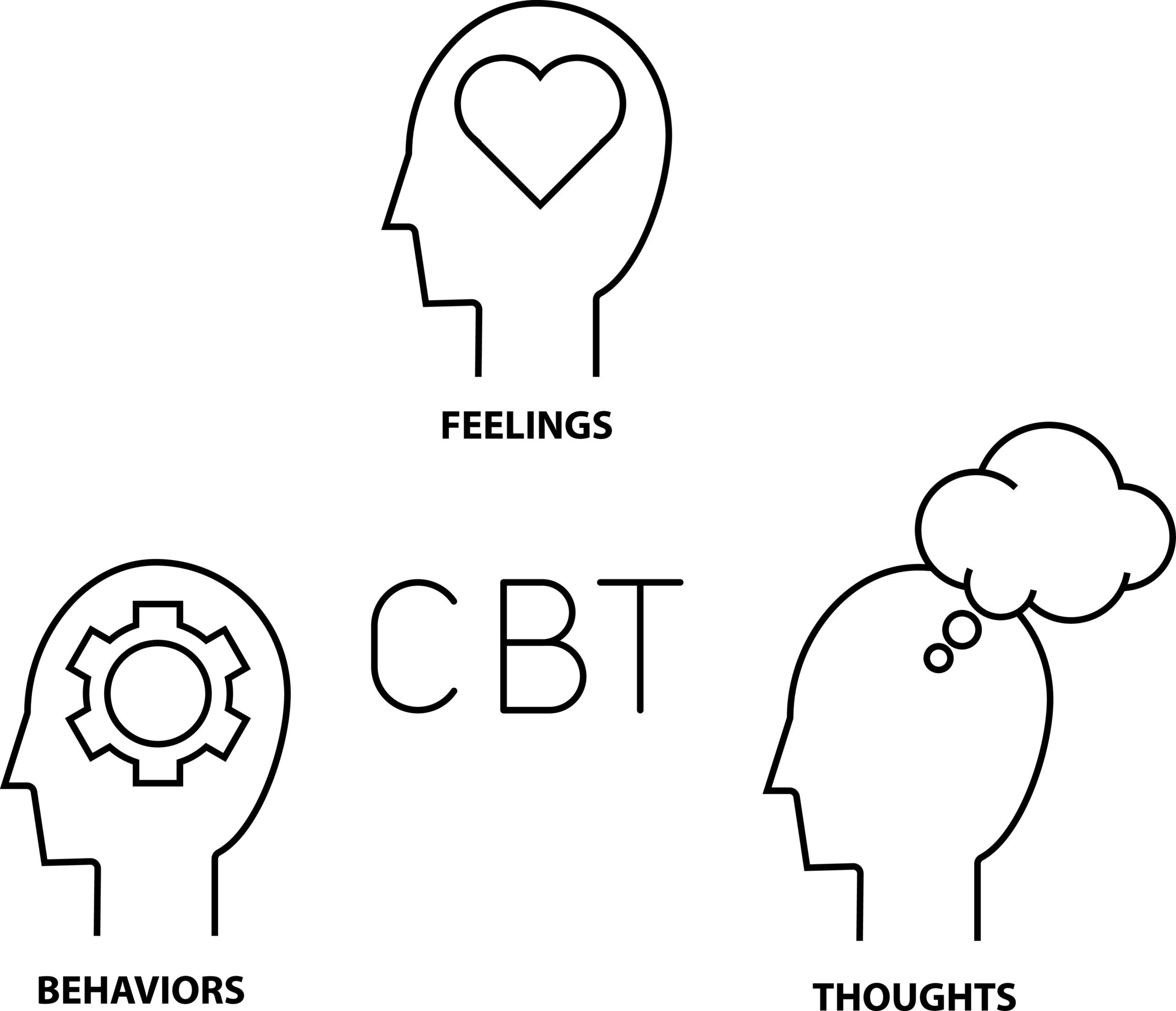Cognitive Behavioral Therapy
Cognitive Behavioral Therapy
Addiction isn’t the result of one hit or drink. It comes after multiple times doing drugs or drinking, and it can take months or even years to happen. Some people believe that negative behavior results from your negative thoughts and feelings about critical life situations. This contributes to a mode of talk therapy called cognitive behavioral therapy (CBT). If you’re searching for “cognitive behavioral therapy near me,” you might be ready for this type of therapy.
Millions of people enroll in cognitive behavioral therapy to recover from addiction and see positive results. Learn more about how CBT works and how it can help you find fulfillment in your life.
What is Cognitive Behavioral Therapy?
Cognitive behavioral therapy is a short-form version of talk psychotherapy that focuses on a person’s thoughts, feelings, and behaviors regarding a certain situation. This differs from most talk therapies, which focus mostly on the “why” as well as your past experiences. By changing your thought patterns, you can learn new ways to behave and lead a more productive life.
CBT is based on the following beliefs:
- Thinking in unhelpful ways can lead to mental issues
- Learning unhelpful behavior leads to these same problems
- People can learn more productive ways of behaving and thinking
- Developing new habits can motivate people to act better and relieve physical and mental health symptoms.
Practitioners of CBT believe that the way we interpret critical events in our lives dictates how we feel and end up behaving. When you think unhealthy thoughts, you won’t be able to function with confidence. Through goal-setting and focusing on specific problems, you’ll be more poised to achieve your potential.
Cognitive behavioral therapy can effectively treat the following:
- Substance use disorders
- Eating disorders
- Anxiety
- Depression
- Post-traumatic stress disorder (PTSD)
- Schizophrenia
- Bipolar disorder
- Phobias
- Sleep disorders

Types of Cognitive Behavioral Therapy
Aside from cognitive behavioral therapy itself, three other main types of therapy involve CBT.
- Multimodal therapy: This addresses seven modalities: affect, behavior, cognition, drug/biological considerations, imagery, interpersonal factors, and sensation. Addressing these will help treat psychological issues.
- Rational emotive behavior therapy (REBT): This involves pinpointing beliefs that are irrational, challenging them, and learning to recognize and change them.
- Dialectical behavior therapy (DBT): Originally designed to treat borderline personality disorder, DBT now treats many types of issues. DBT focuses mainly on how you communicate and how you interact in relationships.
How Does CBT Work?
Cognitive behavioral therapy is performed in a structured amount of sessions. How many sessions you have depends on a few things, including the type of situation or disorder, the severity of your symptoms, and how quickly you make progress. However, you’ll usually attend anywhere from five to 20 sessions. Many people like that CBT doesn’t take too long to complete.
In your first session, you and your therapist will determine issues on which you want to focus, as well as the behaviors that are limiting you. As your sessions progress, you’ll learn healthy coping skills through role-playing activities, journaling, and learning how to calm your body and mind. Your therapist will most likely assign you homework so that you can practice the skills you’ve learned in CBT in the real world.
Over time, your therapist will become your confidante. You’ll open up to him or her about life experiences that you might not normally talk about with others. Together, you’ll work on changing how you view your situations and your world.
For example, let’s say you’re someone with an extreme fear of going to the dentist. This might stem from a negative experience with a dentist in the past. As a result, you might fear that you’ll die or have severe pain from a dental procedure. When you’re in CBT, your counselor can help you address this irrational fear. Just because you had one negative experience doesn’t mean all of them will be that way! You and your counselor will create a plan for seeing dental visits in a new and positive way.
What Are the Steps of Cognitive Behavioral Therapy?
Cognitive behavioral therapy generally follows four steps.
Identify Critical Situations in Your Life
Situations like these include a career change, divorce, loss, or dealing with a mental health disorder. You might want to identify these with your therapist and figure out which ones you want to focus on.
Be Aware of Your Thoughts and Feelings on These Situations
When you were going through these situations (or if you’re going through them now), how did you feel? You’ll talk about these feelings with your mental health counselor. You might observe how you’ve interpreted the situation, your beliefs about yourself and others, and self-talk, or what you tell yourself about an experience.
Pinpoint Any Negative Thinking
Your counselor will ask you to think about your emotional, mental, and physical responses to these situations. This way, you can recognize any patterns that might be contributing to your issues.
Turn Negative Behaviors Into Positive Ones
Once you identify these negative behaviors and patterns, you’ll begin the process of changing these into more productive ones. Although this might be difficult, it’s doable! You and your therapist will discuss whether these behaviors are based on false perceptions of the situation. It will take some time for you to change your long-standing beliefs, but you’ll end up all the better for it.
What Are the Benefits of Cognitive Behavioral Therapy?
Cognitive behavioral therapy offers a multitude of benefits. It’s a short-term therapy, so you can accomplish your goals within a quick time frame.
While in cognitive behavioral therapy, you’ll learn how to distinguish between irrational thoughts and facts, challenge any underlying assumptions that might be incorrect, and develop a more positive way of thinking. You’ll also become aware of your different moods and be able to see situations from different perspectives.
Cognitive behavioral therapy can also teach you how to stop taking the blame for everything. You will also learn how to focus on how things are in the moment instead of how you think they should be.
Cognitive Behavioral Therapy vs. Dialectical Behavior Therapy
We’ve talked about different kinds of cognitive behavioral therapy, and dialectical behavior therapy (DBT) is one of them. They both focus on thoughts, behaviors, and feelings; however, they have several important differences.
DBT focuses more on how people interact in relationships and how they react to their environments. This especially works on people with borderline personality disorder since they have trouble maintaining lasting relationships. They react to situations more intensely than average people do. While CBT consists mainly of individual sessions, DBT includes a mixture of both individual and group therapy sessions.
Overall, dialectical behavior therapy enhances the effectiveness of cognitive behavioral therapy.
How Can I Get the Most Out of a CBT Session?
Cognitive behavioral therapy (and any other therapy) only works if you give it your all. By following these tips, you’ll be sure to get the most out of your therapy sessions.
- Stick to the treatment plan. On some days, you might be tempted to skip sessions if you’re not feeling well or you’re overwhelmed. However, this can stop or hold up your progress. Give some thought to what you want to talk about in each session.
- Be open and honest in your sessions. If you’re honest with your therapist about how you’re feeling, you can’t make progress. It’s that simple. You also need to be open to new ways of thinking and behaviors. Talk to your therapist if you feel uncomfortable about sharing certain thoughts.
- Don’t expect overnight results. Success takes time and effort. There are days when you might feel discouraged, but you must trust the process. You might find it painful to delve into complicated emotional issues from your past. It might be several weeks before you start to see positive changes.
- Think of CBT as a partnership between you and your counselor. As we’ve said before, your therapist will become your confidant as you navigate your sessions together. When you both share in your decision-making, your therapy will be more effective. Make sure you and your therapist agree on the issues you want to tackle.
- Make sure you do your homework. Homework assignments are opportunities for you to practice what you’ve learned in CBT in real life. If you don’t stay on top of your homework, you won’t get as much of a learning experience.
- Talk to your therapist if you feel CBT isn’t working. Although CBT does treat many types of disorders, it might not be the best mode of therapy for you. We do suggest that you give your sessions time, but if you really feel like you’re not making progress, speak with your counselor. He or she can help you find a therapy that works better for your needs.

Where Can I Find Cognitive Behavioral Therapy Near Me?
Typing “cognitive behavioral therapy near me” into a search engine like Google or Bing can help you find counselors nearby. This will normally lead to thousands of results. You can also use resources like Psychology Today to search for cognitive behavioral therapists that are close to you.
After you find a result from typing “cognitive behavioral therapy near me,” make sure you research each therapist. Determine if you want a male or female therapist, and also make sure that the counselor takes your insurance.
Get Help at CNV Detox Today
If you or someone you know is dealing with a substance use disorder, CNV Detox has programs that will help you achieve sobriety. Contact us today to learn more and speak with our representatives. Hope is only a phone call away!
Take the Next Step
The path to recovery is only one step away. Begin your treatment at CNV Detox in Los Angeles, California as soon as the same day. For your convenience, we work 24/7. Our team is ready to help as soon as you reach out.
